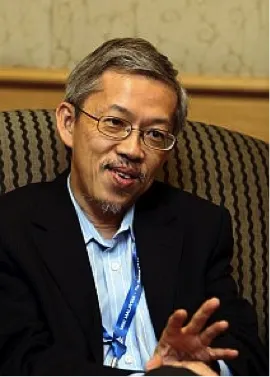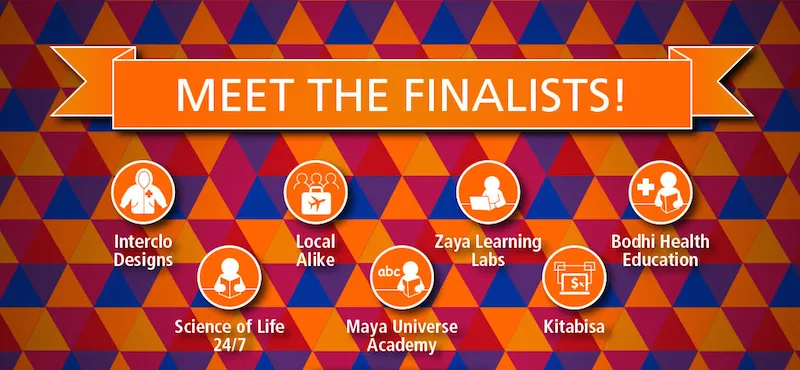Understanding Prof. Wong Poh Kam’s vision behind the DBS-NUS Social Venture Challenge Asia
This article is part of Young Entrepreneurs of the DBS-NUS Social Venture Challenge Series
Professor Wong Poh Kam is a very well known and respected Prof. at the NUS School of Business and concurrently the Director for NUS Entrepreneurship Centre, which promotes entrepreneurship education and outreach activities and runs a wide range of university technology spin-off support programs including the NUS Enterprise Incubator (NEI), various seed funding schemes and mentoring services. He obtained two BSc.’s., an MSc. and a Ph.D. from MIT.
An entrepreneur who co-founded three companies prior to joining academia, Prof. Wong has been an active angel investor with investment in over a dozen high tech start-ups in Singapore, Silicon Valley, China and India. He is also a mentor to many entrepreneurs.
Programs that he has initiated include Start-Up@Singapore, the largest annual business plan competition in Singapore, the Global Entrepreneurship Week in Singapore, the Social Venture Lab at NUS, Lean Launchpad@Singapore as well as the DBS-NUS Social Venture Challenge Asia.

We interacted with Prof. Wong to understand his vision for the DBS-NUS Social Venture Challenge Asia – a pan Asia competition for social enterprises aimed at identifying and supporting new social ventures that have the potential to generate scalable and sustainable social impact.
Edited excerpts of our conversation with Prof. Wong:
YS: What are some of the objectives that you want to achieve for the social entrepreneurship ecosystem in Asia with the DBS-NUS SVC challenge?
Prof. Wong: Our primary objective is to raise awareness and to catalyze the development of a vibrant ecosystem to support social entrepreneurship in Asia.
With this challenge, we hope to build a robust community of practicing and aspiring social entrepreneurs and capacity builders, and to establish a strong network of impact partners across Asia who can provide help and support to sustain the growth of this community.
The Challenge thus provides a learning platform to equip the participants with the knowledge and skills to start a social venture and help with the valuable network contacts and supporting services of our network of impact partners to help social entrepreneurs grow their ventures.
YS: You have initiated the Social Venture Lab at NUS and you also lead the research program on technology entrepreneurship and innovation strategy. Tell us a little more about them.
Prof. Wong: The Social Venture Lab at NUS was initiated to promote and incubate innovative social ventures in Singapore that have the potential to generate scalable and sustainable social impact in emerging markets and especially for social groups at the bottom of the pyramid.
When it was first initiated in 2011, it was in collaboration with the Grameen Creative Lab, and we leveraged on their networks to invite social business leaders like Muhammad Yunus to speak in Singapore, as well as run boot camps for social entrepreneurs. After a 2-year partnership, the initiative became known as the Social Venture Lab at NUS and it continues to promote social entrepreneurship, with initiatives like this challenge and several other initiatives.
Till date, we have incubated 11 social ventures, and I am pleased to say that several of them have received follow-on investments, including Saught, Milaap, Tware and Bagosphere.
The incubation of innovative social entrepreneurs is part of the larger mission of the centre to nurture innovative start-ups by NUS professors, students and alumni since the formation of the centre in 2000. Over the years, we have built a comprehensive technology startup incubation program comprising of seed funding, incubation space, training workshops, mentorship by experienced entrepreneurs and investors, and network connections to start-up investors and overseas markets. In a way, we are now at the beginning of replicating that ecosystem for innovative social ventures.
An integral part of our work in nurturing social entrepreneurs is to develop and validate analytical tools that they can use to design and improve their business models. This is the main focus of our centre’s research on social entrepreneurship – to provide thought leadership on how to design and build purpose-driven business models to achieve social impacts in a financially sustainable way.
YS: How does this challenge align with the overall mission of NUS Entrepreneurship Centre? And what are some other initiatives in the social entrepreneurship space?
Prof. Wong: This challenge aligns very closely with the overall mission of the Centre to promote social entrepreneurship. While our centre’s work has a strong focus on the NUS community, the partnership with DBS enables us to reach out to the much larger social entrepreneurship community across Asia.
Under the umbrella of the Social Venture Lab at NUS initiative, other outreach events include our annual Social Venture Week, a week of social entrepreneurship related events to inspire, connect and engage a diverse audience with an interest in social entrepreneurship.
In addition, we also organise TEDxKRP, a TEDx event focusing on social change through local innovation and global entrepreneurship.
A major part of our mission is to incubate and grow sustainable and scalable social ventures. Under our incubation programme, we provide NUS students with a SGD10,000 Innovation & Entrepreneurship Practicum Grant to pilot test their ideas. We also administer the Young Social Entrepreneurs Programme grant of SGD50,000 by the Ministry of Social and Family Development of Singapore. This grant is applicable to budding social entrepreneurs hoping to make an impact in Singapore. On top of that, we of course provide incubation services that include dedicated mentorship, office space, shared services (corporate secretary, accounting & PR), and most importantly, access to our international network of mentors, investors, academia and corporates.

YS: Currently, what do you think are some of the big hurdles for the social entrepreneurs in Asia?
Prof. Wong: We saw a need for a more inclusive pan-Asia competition, as there is none at the moment. The ones that we have come across are generally country-specific or only open to a particular group. Our criteria is that the social ventures applying to this challenge must create an impact in Asia and should not have raised more than SGD100,000.
The biggest hurdle to social entrepreneurs in Asia is to develop financially sustainable business models to achieve the desired impact and to attract the right form of financing to scale this impact. For achieving this, we need a more vibrant impact investment community to be based in Asia. We also need the development of more financing sources that support blended models besides the pure charity or pure profit-making model.
The second biggest hurdle faced by social entrepreneurs in many Asian countries is that they don’t know about how social entrepreneurs in other places may have overcome similar challenges that they are facing in their own local social entrepreneurial efforts. There is a lack of awareness and knowledge sharing platform. A platform for sharing and exchanging successful social entrepreneurship practices and models is thus very much needed. We hope the challenge will help catalyze both these developments.
YS: Post the challenge, how do you plan to support/mentor the social ventures reaching the semifinal or final stage in the competition?
Prof. Wong: The steps ahead for the participants after the Challenge are actually the most important ones. We will work with our impact partners to provide the critical support to these entrepreneurs post-competition, in terms of mentorship and incubation. We, as the organizers, in our capacity will of course continue to follow-up with the semifinalists and finalists after the competition, and also most importantly allow them access to our network.
We see this challenge as an inclusive platform to promote social entrepreneurship. We believe that there are many more organizations across Asia providing support to social entrepreneurship ecosystem and we can all do a better job by collaborating with each other. We are keen on inviting such organizations to join our platform and being part of the network of impact partners. Together, we all can help accelerate the overall development of the social entrepreneurship ecosystem in Asia.
DBS-NUS Social Venture Challenge Asia finals are scheduled to be held in Singapore on June 6th. Check more details here.







